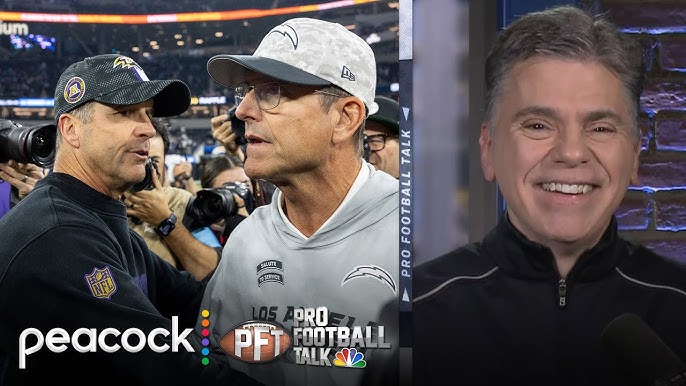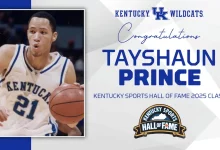Baltimore Ravens head coach John Harbaugh, a Super Bowl champion, surpasses Pete Carroll and Sean Payton with 172 NFL victories, edging ahead in career wins.

The NFL is a league rooted in history, tradition, and relentless pursuit of excellence. Among the many figures who have shaped its landscape, John Harbaugh stands out as a remarkable leader, strategist, and motivator. The Baltimore Ravens head coach recently achieved a significant milestone by surpassing legendary coaches Pete Carroll and Sean Payton, reaching 172 NFL wins. This accomplishment not only highlights Harbaugh’s durability and consistency but also cements his legacy as one of the league’s most successful and respected coaches. This comprehensive analysis delves into Harbaugh’s coaching journey, his philosophies, the context of his achievement, and its implications for the Ravens and the NFL at large.
Early Life and Coaching Beginnings
John Harbaugh was born on September 23, 1962, in Toledo, Ohio, into a family with a rich football background. His father, Jack Harbaugh, was a renowned football coach, which undoubtedly influenced John’s path into the sport. Harbaugh played college football at Miami University in Ohio, where he was a wide receiver and team captain. His playing career was modest, but his passion for football translated into a desire to coach.
Harbaugh’s coaching career began in the college ranks, where he served as a graduate assistant at the University of Pittsburgh and later as a coach at various college programs. His transition to the NFL began in 2007 when he was hired as the special teams coordinator for the Philadelphia Eagles. His innovative approach and leadership qualities quickly gained recognition, leading to his appointment as the Ravens’ head coach in 2008.
Harbaugh’s Rise to Prominence
Taking over a franchise that had experienced mixed success, Harbaugh faced the challenge of rebuilding a team and establishing a new identity. His early years were marked by steady improvement and a commitment to disciplined, physical football. Under his leadership, the Ravens became known for their stout defense, special teams excellence, and strategic offensive schemes.
In his first season (2008), Harbaugh led the Ravens to an 11-5 record and an AFC North division title, signaling the start of a successful era. His coaching acumen was further validated when he led the team to the AFC Championship game in 2008, narrowly missing a Super Bowl appearance. The Ravens’ defensive identity, spearheaded by stars like Ray Lewis, Ed Reed, and Terrell Suggs, became synonymous with Harbaugh’s leadership style.
The Super Bowl Triumph
Harbaugh’s crowning achievement came in the 2012 season when he led the Ravens to Super Bowl XLVII. The game, played on February 3, 2013, was a nail-biting contest against the San Francisco 49ers, a matchup steeped in personal and professional rivalry, as Harbaugh’s brother, Jim Harbaugh, was the 49ers’ head coach.
The game is remembered for its dramatic moments, including a blackout that halted play for 34 minutes, and ultimately, the Ravens’ resilience. Baltimore triumphed 34-31, securing their second Super Bowl victory in franchise history. Harbaugh’s leadership, strategic adjustments, and team motivation were widely praised, underscoring his status as a top-tier NFL coach.
Career Win Milestone: Surpassing Pete Carroll and Sean Payton
Harbaugh’s achievement of 172 NFL wins places him among the league’s elite coaches. Specifically, he has surpassed esteemed figures like Pete Carroll, head coach of the Seattle Seahawks, and Sean Payton, former New Orleans Saints coach, both of whom are renowned for their success and innovative approaches.
Pete Carroll: Known for his charismatic leadership and innovative defensive schemes, Carroll has built a competitive Seahawks team, leading them to a Super Bowl victory in 2014 and multiple playoff appearances. His coaching career spans college football at USC and a long tenure with the Seahawks.
Sean Payton: Celebrated for his offensive ingenuity and leadership, Payton led the Saints to a Super Bowl victory in 2009 and maintained consistent playoff appearances until his departure in 2021. His offensive schemes, especially the “Saints’ Air Raid,” revolutionized NFL passing attacks.
Harbaugh’s crossing of the 172-win threshold signifies his durability, adaptability, and consistent success over a relatively shorter coaching span compared to some peers. It underscores his ability to maintain sustained competitiveness and deliver results under various circumstances.
Coaching Philosophy and Style
John Harbaugh’s coaching philosophy revolves around discipline, accountability, and resilience. His teams are characterized by their physicality, special teams excellence, and situational awareness. Harbaugh emphasizes a balanced approach—combining strategic offensive schemes with a formidable defense—creating a comprehensive team identity.
He is known for his adaptability, adjusting game plans based on opponent strengths and weaknesses. His emphasis on mental toughness and team cohesion fosters a culture where players are motivated to perform at their best, especially in high-pressure situations.
Harbaugh’s leadership style is direct yet empathetic. He maintains strong relationships with players and staff, fostering a culture of trust and accountability. His ability to motivate players and adapt to evolving NFL trends has been key to his sustained success.
Impact on the Baltimore Ravens
Harbaugh’s leadership has been instrumental in shaping the Ravens’ identity. His strategic focus on defense, complemented by innovative offensive schemes, aligns with the franchise’s tradition of physical, disciplined football. Under his guidance, the team has experienced multiple playoff runs, consistent winning seasons, and a Super Bowl victory.
His emphasis on special teams, often overlooked in other teams, has been a hallmark of Ravens football. The franchise’s special teams units have frequently ranked among the league’s best, providing critical field position advantages and scoring opportunities.
Harbaugh’s impact extends beyond wins. He has fostered a resilient team culture that overcomes adversity, such as injuries or challenging schedules. His leadership during difficult seasons, including navigating the COVID-19 pandemic, demonstrated his resilience and commitment.
Comparing Harbaugh with Pete Carroll and Sean Payton
While Harbaugh’s 172 wins position him among the league’s most successful coaches, comparing him to Pete Carroll and Sean Payton offers insight into different coaching philosophies and career trajectories.
Pete Carroll: Known for his energetic, player-friendly approach, Carroll emphasizes competition and a dynamic, aggressive style of play. His teams are renowned for their defensive versatility and innovative schemes, exemplified by the “Legion of Boom.” Carroll’s longevity and success, including a Super Bowl victory, showcase consistency and adaptability.
Sean Payton: Recognized for offensive innovation, Payton revolutionized the Saints’ attack, blending spread concepts with traditional power running. His leadership led the Saints to a Super Bowl victory and sustained playoff success. Payton’s ability to elevate quarterbacks like Drew Brees underscores his offensive genius.
Harbaugh’s strengths lie in his versatility, leadership, and ability to develop a balanced team identity. Unlike Carroll’s defense-oriented teams or Payton’s offensive schemes, Harbaugh’s teams are characterized by resilience, physicality, and strategic adaptability.
Broader Significance in the NFL
Harbaugh’s milestone is not just a personal achievement; it reflects broader themes within the NFL:
Evolution of Coaching: Harbaugh’s success demonstrates that a coach’s ability to adapt and lead with discipline remains vital, even amidst evolving offensive and defensive trends.
Leadership and Culture: His emphasis on team culture, resilience, and accountability has become a benchmark for effective leadership in the league.
Franchise Stability: Harbaugh’s tenure exemplifies how consistent coaching stability contributes to sustained success, contrasting with the high turnover rates in the NFL.
Legacy Building: Surpassing peers like Carroll and Payton elevates Harbaugh’s standing in league history and highlights the importance of perseverance and adaptability.
Challenges and Future Outlook
Despite his achievements, Harbaugh faces ongoing challenges:
Maintaining Success: The NFL’s competitive landscape demands continuous adaptation. Harbaugh must evolve his strategies to counter increasingly sophisticated opponents.
Player Development: Developing young talent and integrating new players is crucial for sustained success.
Managing Expectations: As Harbaugh’s legacy grows, managing team expectations and maintaining motivation will be vital.
Looking ahead, Harbaugh’s leadership will be tested by new challenges, including roster changes, league innovations, and the evolving nature of NFL offenses and defenses. His proven track record suggests he is well-equipped to navigate these hurdles.
Personal Legacy and Impact
Harbaugh’s legacy extends beyond wins and titles. He is regarded as a coach who embodies resilience, integrity, and dedication. His ability to foster a cohesive team culture and adapt to changing circumstances has earned him respect league-wide.
His milestone of surpassing Pete Carroll and Sean Payton in wins cements his place among the NFL’s coaching elite. It also serves as an inspiration for aspiring coaches and players, emphasizing the importance of perseverance, adaptability, and leadership.
John Harbaugh’s achievement of 172 NFL wins, surpassing iconic coaches Pete Carroll and Sean Payton, marks a significant milestone in his illustrious coaching career. It reflects his strategic acumen, leadership qualities, and the profound impact he has had on the Baltimore Ravens. As the NFL continues to evolve, Harbaugh’s legacy as a resilient, adaptable, and effective leader is firmly established. His journey underscores the importance of perseverance, team culture, and strategic innovation in achieving sustained success at the highest levels of professional football. Moving forward, Harbaugh’s continued influence and leadership will undoubtedly shape the future of the Ravens and contribute to his enduring legacy within the league’s rich history.









